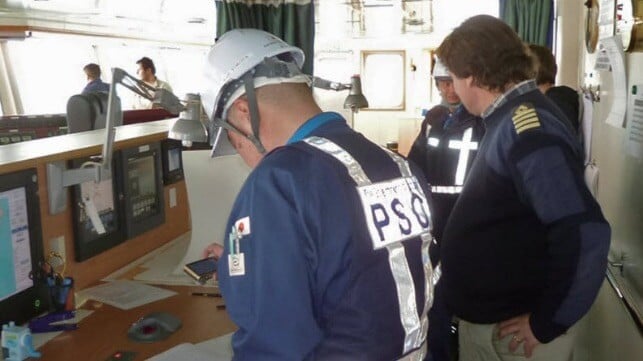Three Month Port State Inspection Program Focuses on Crew Welfare and Wages

Crew welfare and maintaining basic rights covered under the nearly universal Maritime Labor Convention has become a growing concern and now the two leading umbrella organizations for Port State Control, Paris and Tokyo, are launching a coordinated inspection campaign. During the three-month effort, Port State inspectors will work to raise awareness and verify that ships comply with the requirements of the conventions.
The International Maritime Organization highlights that the MLC, which went into force in 2013, today covers 96 percent of the gross tonnage of vessels worldwide. The IMO estimates that more than 1.5 million seafarers are covered by the master contract that stipulates working and living conditions, including minimum age, employment agreements, hours of work and rest, payment of wages, paid annual leave, repatriation, on board medical care, accommodation, food and catering, health and safety protection and accident prevention, and complaint procedures for seafarers.
Many issues emerged during the pandemic and the challenges of working and travel for seafarers which in turn raised the awareness of Port State inspectors. Some regimes, such as Australia’s Australian Maritime Safety Authority (AMSA) have been very outspoken even banning vessels for flagrant or repeated violations of the MLC.
The inspection campaign jointly overseen by the Paris MoU and Tokyo launches on September 1 and runs through November 30. Inspectors will be using a questionnaire developed by the two organizations. Among the specific areas to be included are crew wages, seafarer employment agreements, and financial securities, including repatriation and shipowners’ liability.
Announcing the effort, the two organizations said their goal is to create awareness about the requirements. Inspectors will seek to verify that a vessel complies with the requirements under the international agreements. Each ship will only be inspected once during the three months.
If non-conformities are found, the port state will have options including recording a deficiency and instructing the master to rectify it within a certain period of time. In extreme cases, they can detain a ship until the serious deficiencies have been rectified or until the port state has accepted a proposal for a plan of action.
The Tokyo and Paris organizations include as members nearly all the port state organizations. The Paris MoU, for example, reports participation by 28 state maritime administrations. Annually they conduct over 17,000 vessel inspections. A typical inspection seeks to ensure that ships meet international safety, security, and environmental standards, and during this program, there will be an added emphasis on ensuring that crewmembers have adequate living and working conditions.
In addition to raising awareness on vessels, the organizations report the results of the campaign will be analyzed and findings will be presented to the governing bodies of both MoUs for possible submission to the International Labour Organization and the International Maritime Organization.
No comments:
Post a Comment